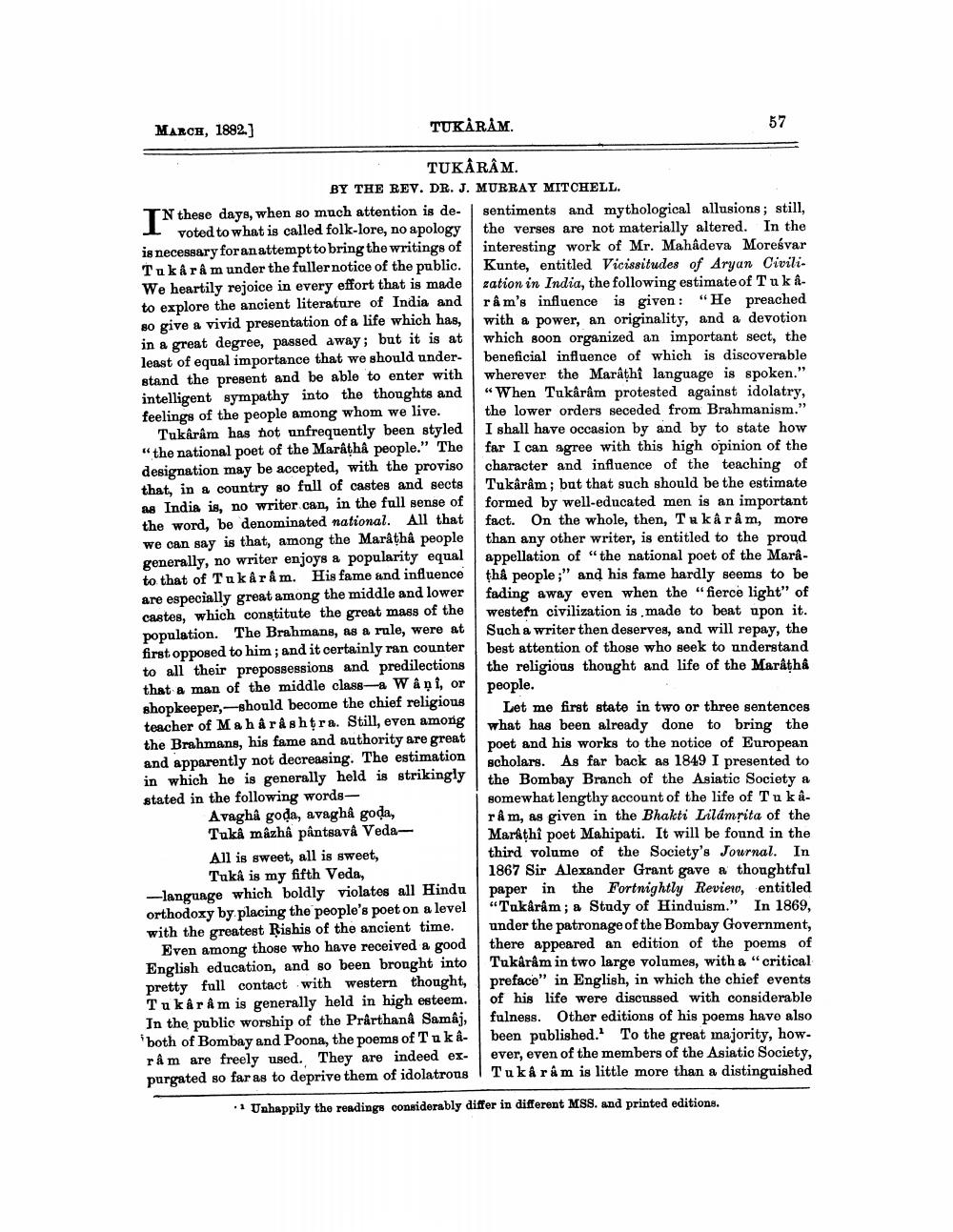________________
MARCE, 1892]
TUKARÅM.
TUKÂRÂM.
BY THE REV. DR. J. MURRAY MITCHELL. TN these days, when so much attention is de sentiments and mythological allusions; still, 1 voted to what is called folk-lore, no apology the verses are not materially altered. In the is necessary foran attempt to bring the writings of interesting work of Mr. Mahadeva Moreśvar Tukârâ munder the fuller notice of the public. Kunte, entitled Vicissitudes of Aryan CiviliWe heartily rejoice in every effort that is madezation in India, the following estimate of Tukito explore the ancient literature of India and râm's influence is given: "He preached so give a vivid presentation of a life which has, with a power, an originality, and a devotion in a great degree, passed away; but it is at which soon organized an important sect, the least of equal importance that we should under- beneficial influence of which is discoverable stand the present and be able to enter with wherever the Marathi language is spoken." intelligent sympathy into the thoughts and "When Tukârâm protested against idolatry, feelings of the people among whom we live. the lower orders seceded from Brahmanism."
Tukaram has not unfrequently been styled I shall have occasion by and by to state how "the national poet of the Markthå people." The far I can agree with this high opinion of the designation may be accepted, with the proviso character and influence of the teaching of that, in a country so full of castes and sects Tukârâm; but that such should be the estimate as India is, no writer can, in the full sense of formed by well-educated men is an important the word, be denominated national. All that
fact. On the whole, then, Tuk & rå m, more we can say is that, among the Marathå people than any other writer, is entitled to the proud generally, no writer enjoys a popularity equal | appellation of "the national poet of the Mara
appellation of the national noet of + to that of Tu kâr å m. His fame and influence thâ people;" and his fame hardly seems to be are especially great among the middle and lower fading away even when the "fierce light" of castes, which constitute the great mass of the western civilization is made to beat upon it. population. The Brahmans, as a rule, were at Such a writer then deserves, and will repay, the first opposed to him; and it certainly ran counter best attention of those who seek to understand to all their prepossessions and predilections the religions thought and life of the Marâthâ that a man of the middle class-a Wani, or people. shopkeeper, should become the chief religious
Let me first stato in two or three sentences teacher of Maharashtra. Still, even among
what has been already done to bring the the Brahmans, his fame and authority are great
poet and his works to the notice of European and apparently not decreasing. The estimation
scholars. As far back as 1849 I presented to in which he is generally held is strikingly
the Bombay Branch of the Asiatic Society a stated in the following words
somewhat lengthy account of the life of Tu kaAvagha goda, avaghê goda,
rám, as given in the Bhakti Lilámpita of the Tukå mâzhâ pântsava Veda
Markthî poet Mahipati. It will be found in the All is sweet, all is sweet,
third volume of the Society's Journal. In Tuka is my fifth Veda,
1867 Sir Alexander Grant gave a thoughtful -language which boldly violates all Hindu paper in the Fortnightly Review, entitled orthodoxy by placing the people's poet on a level "Tukaram;a Study of Hinduism." In 1869, with the greatest Rishis of the ancient time. under the patronage of the Bombay Government,
Even among those who have received a good there appeared an edition of the poems of English education, and so been brought into Tukaram in two large volumes, with a "critical pretty full contact with western thought, preface" in English, in which the chief events Tu kâr Âm is generally held in high esteem. of his life were discussed with considerable
hlie worship of the Prarthana Samaj, fulness. Other editions of his poems have also both of Bombay and Poona, the poems of Tuk & been published. To the great majority, how. råm are freely used. They are indeed ex- ever, even of the members of the Asiatic Society, purgated so far as to deprive them of idolatrous Tuk á rám is little more than a distinguished
. Unhappily the readings considerably differ in different MSS. and printed editions.




